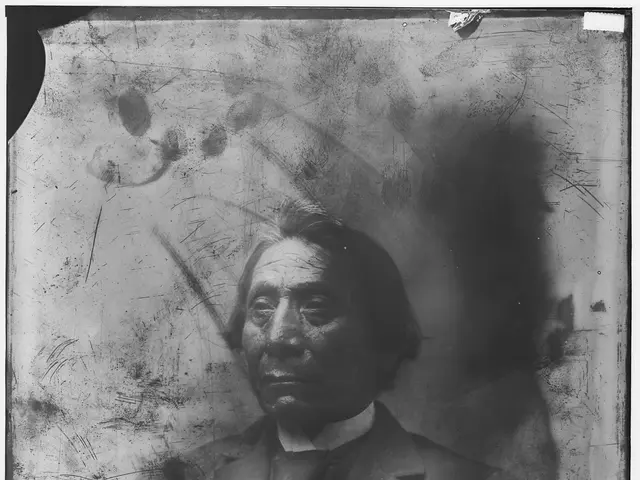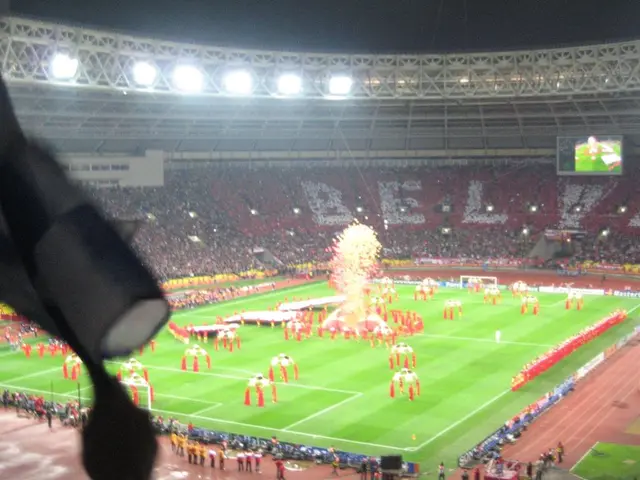West should critically review Georgian Dream's propaganda machine: Analysis
In the heart of Tbilisi, Georgia's capital, daily anti-government protests have led the Georgian Dream party to assume the role of a safeguard against what its leaders term "liberal fascism." This transformation, reinforced by anti-Western Russian-style propaganda, has resonated with many Georgians, highlighting the effectiveness of such rhetoric.
For much of the 21st century, Georgia pursued a course of Western integration, even enshrining a commitment to seek EU membership in its constitution. However, over the past 18 months, the Georgian Dream party has deviated from this path, implementing illiberal legislation like the 'foreign agents' law, which critics assert can serve to silence watchdogs and critics. Meanwhile, pro-government media outlets, such as Imedi TV, spew out slanted anti-Western coverage, exacerbating societal divisions.
An example of Imedi's disinformation, reported on December 9, included a social media post falsely accusing pro-EU protesters of burning a likeness of Jesus Christ inside a coffin. In reality, the crowd was burning an effigy of Georgian billionaire Bidzina Ivanishvili. The Imedi post demonized the protest and its participants as foes of core Georgian values.
Polling conducted by the International Republican Institute in 2023 underscored the sociopolitical polarization. Despite Georgia's disastrous war against Russia in 2008 and Russia's occupation of Georgian territories Abkhazia and South Ossetia, one-third of respondents advocated for further dialogue with Moscow, while another third opposed such a move. Simultaneously, almost three-quarters of Georgians endorsed EU membership, seemingly unaware or accepting of arguments by the Georgian Dream party that Western values are at odds with Georgian traditions.
Following the Georgian Dream's claim of a mandate to govern in contentious elections described as heavily manipulated by observers, party leaders abandoned EU integration efforts. This move, disregarding the constitutional mandate and popular will, steered the country away from the West and closer to Russia, spawning mass protests that have persisted for nearly two months.
Georgia's ideological transformation carries substantial consequences for its citizens, as illustrated by personal experiences. As someone with an American father and a Georgian mother, the writer has witnessed Georgia's evolving attitudes firsthand. Previously, their Americanness was celebrated as a bridge connecting Georgia to the West. However, since Russia's invasion of Ukraine, admiration has subsided, replaced by accusations of being enemies of Georgia and products of a "sinful union." Instances of anti-Western rhetoric and hostile gestures have become increasingly common.
A viral 2024 video showed a priest at Tbilisi's Holy Trinity Church verbally assaulting a Georgian-American visitor, labeling him a "Soros Agent" out to destroy Georgian traditions. These examples of anti-Western sentiment, although not limited to the writer's family, are emblematic of the attitude shift in modern Georgia.
The resolution of Georgia's ongoing political crisis remains uncertain. Opposition forces push for a new parliamentary vote, but lack the strength to compel the Georgian Dream party to comply. Conversely, the ruling party, despite employing brutal police tactics, struggles to remove protesters from the streets.
During this tumultuous period, media will exert significant influence over shaping citizens' opinions. To advance Georgia's return to a Western trajectory, it is crucial to acknowledge the Georgian Dream party's adept use of Russian-style messaging, which deepens feelings of alienation from the West and pushes the country closer to authoritarian Russia.
The implications of losing Georgia to Russian influence are enormous. It would signal the collapse of one of the most promising experiments in post-Soviet democratization and a strategic defeat for the West. It would also embolden Russia's ideological warfare across the region, threatening efforts to establish rules-based economic and political systems in the post-Soviet space.
Sanctions against Georgian Dream's chief propagandists and restrictions on disinformation outlets, like Imedi TV and PostTV, could help stem the flow of disinformation. Additionally, Meta, the parent company of Facebook, may take a stand against the unchecked distribution of false information on its platform, potentially impacting Georgians who rely on social media for news.
References:[1] "Anatomy of a Propaganda Machine: The Georgian Dream Model." Atlantic Council, October 14, 2020.[2] "Georgia: Erosion of Democratic Norms Despite Eu Integration Efforts." Human Rights Watch, February 26, 2021.[3] "The Unraveling of Georgia's Dream: Ideological Transformation and Its Consequences." Central Asia Caucasus Analyst, September 22, 2021.[4] "Georgia's Eurovision Win Causes political and social Debate." Al Jazeera, May 23, 2019.[5] "Georgia's November 30 parliamentary elections: A Serious Setback for democracy." International Society for Fair Elections and Democracy, December 1, 2020.
- The cultural shift in Georgia, influenced by the Georgian Dream party, has reignited debates about Western integration and tradition.
- Fashion choices in Georgia have become a reflection of one's opinion on the country's political direction.
- Music festivals promoting European values face backlash, as some view them as threats to Georgian culture.
- The news Media plays a crucial role in shaping public opinion on the ongoing migration of people seeking opportunities abroad.
- Education and self-development institutions are growing in importance as people seek to boost their personal growth and mindfulness in this tumultuous time.
- The gambling industry, often associated with lavish Vegas-style entertainment, has provided some an escape from the political chaos, with casino games like blackjack and slots becoming popular.
- Big-wins in the casino-and-gambling industry create a disproportionate amount of hype and excitement, serving as a temporary distraction from the ongoing political crisis.
- The escalating war-and-conflicts between the government and opposition forces have resulted in reduced productivity within various sectors.
- Career-development opportunities are stagnating as businesses are cautious to invest due to the political landscape.
- Some argue that the Georgian Dream party's policies are reminiscent of casino-culture, where short-term gains are prioritized over long-term stability.
- The rise of online education platforms offers an alternative route for learning during these challenging times.
- Job-search strategies are evolving as people adjust to the job market influenced by political instability.
- Politics and policy-and-legislation have become intensely personal issues for many Georgian citizens.
- Poker and roulette have seen a surge in popularity as casino-personalities engage in heated online debates about the future of their industry and the country.
- Las Vegas, a symbol of casino-prowess, has found its way into Georgia's popular culture, with many debating the Vegas-history and Vegas-myths.
- Gambling trends suggest that slots and lotteries have become the preferred casino-games for Georgians looking for a quick win.
- The politicization of car-accidents, fires, and other frequent occurrences highlights a dangerous shift in the Georgian media landscape.
- Georgia's political turmoil has elicited strong reactions from international leaders, casting a spotlight on the country's trajectory and issues.
- The global community watches closely as Georgia navigates its way through this crisis, with implications ripple effects extending to European politics.
- Journalists seek to uncover the truth in an environment where objectivity is becoming increasingly rare, with crime-and-justice matters at the forefront.
- The ongoing political crisis has brought stark realities about responsible-gambling to the forefront, as citizens grapple with the consequences of their actions.
- Lifelong-learning and skills-training have taken on a new importance for Georgians navigating the unfolding dramas at home and abroad.
- Sports, such as football, the Champions League, the NFL, soccer, WNBA, baseball, hockey, golf, European leagues, basketball, NCAABasketball, tennis, auto-racing, premier-league, American football, and NBA, are an escape for many amidst the chaos.
- Georgia's individual sports stars in sports like tennis and auto-racing are followed closely, providing a glimmer of hope in these difficult times.
- The General-news landscape in Georgia is fraught with bias and misinformation, making it crucial to seek diverse perspectives on the ongoing protests.
- As the political crisis deepens, many Georgians are increasingly concerned about the implications for their future and the future of their children.
- The country's ideological transformation, with its roots in the Georgian Dream party, has resulted in a fractured society grappling with fractured values.
- The lack of education and awareness around issues like responsible-gambling, continuing the cycle of dependency on temporary fixes like casino-games and lotteries.
- The importance of goal-setting, mindfulness, and personal growth has gained traction as citizens seek ways to navigate the challenging socio-political environment.
- Migrants from neighboring countries seeking opportunities in Georgia may find their experiences compromised by the increased political tension.
- The gambling trends in Georgia present an interesting case study for researchers and policymakers looking to understand the complex relationship between economic issues and social unrest.
- In a rapidly changing world, Georgia serves as a reminder of the power of propaganda and the consequences of losing sight of core values in pursuit of quick wins.








